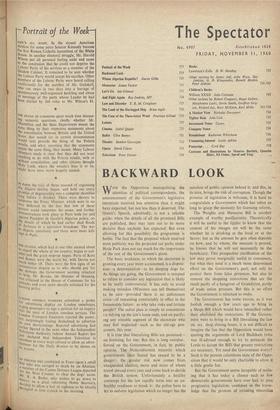— Portrait of the Week— J ACK ' S ALL RIGHT. In the closest
American election for some years Senator Kennedy became the first Roman Catholic incumbent of the White House. In another electoral struggle, Mr, Harold Wilson put all personal feeling aside and came to the conclusion that he could not deprive the Labour Party of his services as a member of the Shadow Cabinet. It remained to be seen whether the Labour Party would accept his sacrifice. Other members of the Labour Party were heard calling Vociferously for the sacrifice of Mr. Gaitskell, who ran twice in two days into a barrage of spontaneously well-organised heckling and abuse at meetings of the party whose Leader he had been elected by 166 votes to Mr. Wilson's 81.
*
THE HOUSE OF COMMONS spent much time discuss- ing semantic questions, chiefly whether Mr. Macmillan and the State Department meant the same thing by their respective statements about the consultation between Britain and the United States that would (or in certain circumstances would not) precede the firing of the Polaris missile, and what, assuming that the statements meant the same thing, they meant. Many Labour Members made it clear that they did not want anything to do with the Polaris missile, with or without consultation, and other citizens thought 1191Y Loch, where the missile's base is to be, might have been more happily named.
IN PARIS the trial of those accused of organising till= Algiers mutiny began, and held out every Promise of degenerating into a complete shambles long before it finished. There were threats to subpoena the Prime Minister, which were in no waY deflected by the fact that few of those present could remember his name, and further demonstrations took place in Paris both for and against President de Gaulle's Algerian policy, on the details of which he had earlier shed floods °f darkness in a television broadcast. The war In Algeria continued, and there were more kill- 'ngs in Paris.
THE rt.00l)s, which had at one tithe seemed about T_,engtilf the whole of the country, began to sub- s'elef and the great mop-up began. Parts of Kent and Sussex were the worst hit, with Devon not much better off. There were the first signs of an `tterintonious dispute as to who, should pay for k damage, the Government seeming reluctant t`') lielP. Mr. Brooke, the Minister of Housing, S criticised in the House of Commons for his attitude, and even more sharply criticised for his housing policy.
*
f�`MON OMNIBUS WORKERS submitted a poster r advertising display on London omnibuses, into passengers to sign a petition for an inquiry Into the state of London omnibus services. The London Transport Executive rejected the poster, not surprisingly feeling disinclined to advertise Its own shortcomings. Rejected advertising had .e..arlier figured in the news when the Independent television Authority (whose Annual Report has just declared that Independent Television is excellent in every way) refused to allow an adver- tlsement for the Doily Worker to be shown on Its screens.
INQUEST was conducted in Truro upon a small boy who was savaged to death by an Alsatian; member of the Canine Defence League departed for the West Country to clear the dogs' name.
historyy as a great reforming Home Secretary, decided to allow a boy of eighteen to be ritually 8trangled at nine o'clock-in the morning.














































 Previous page
Previous page